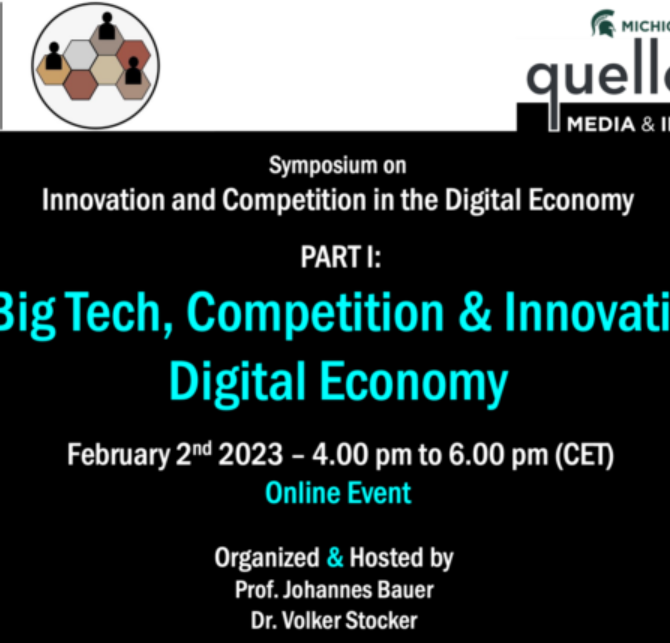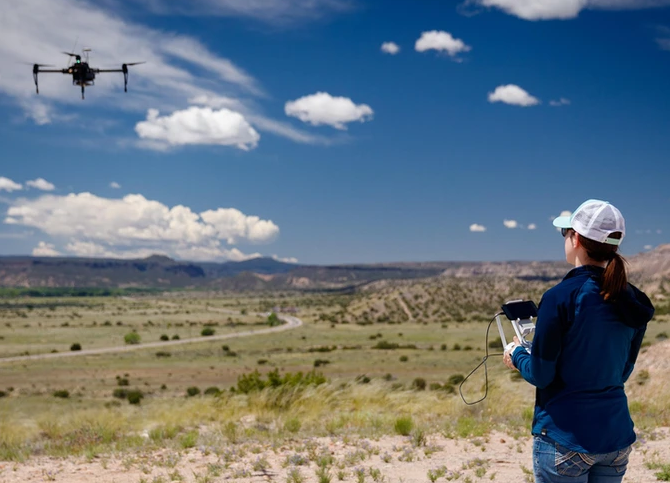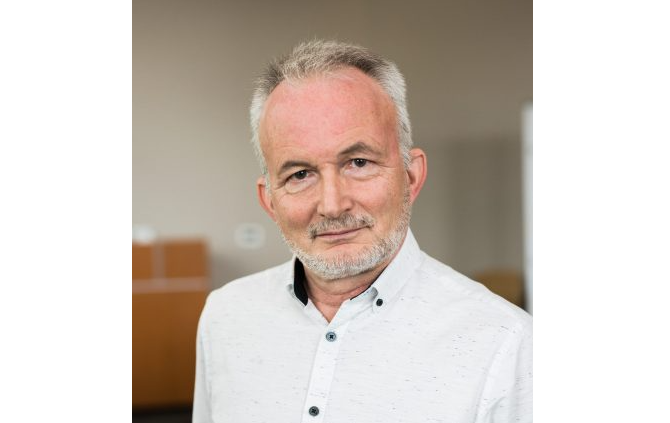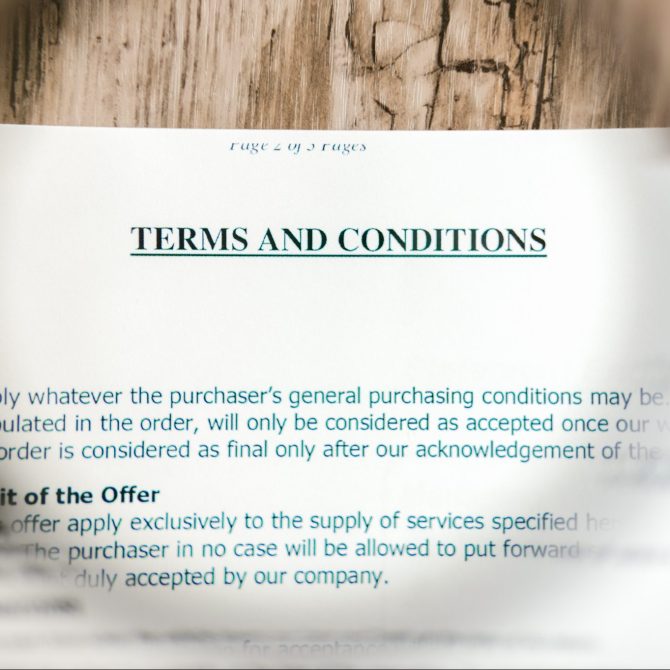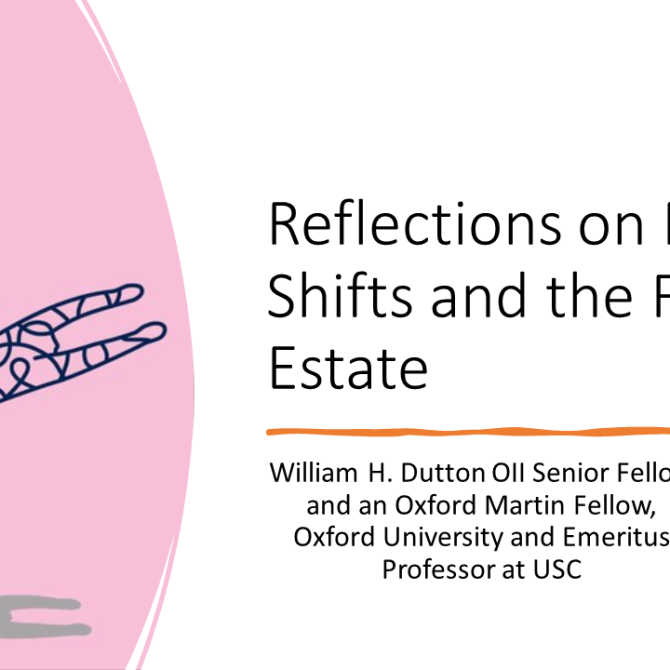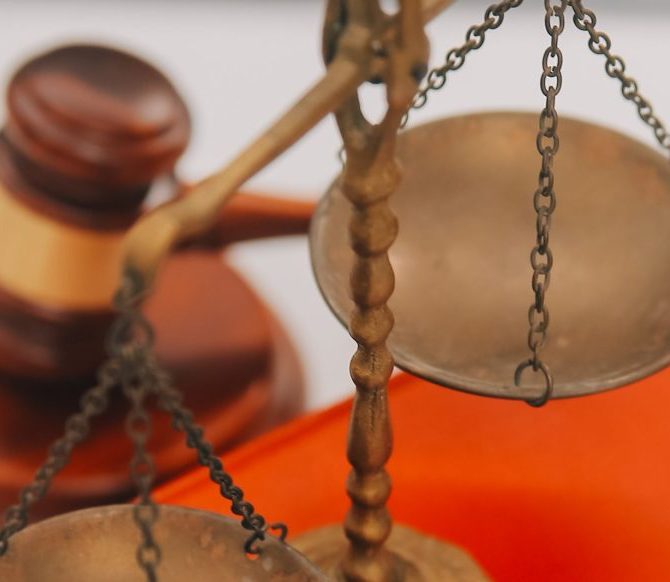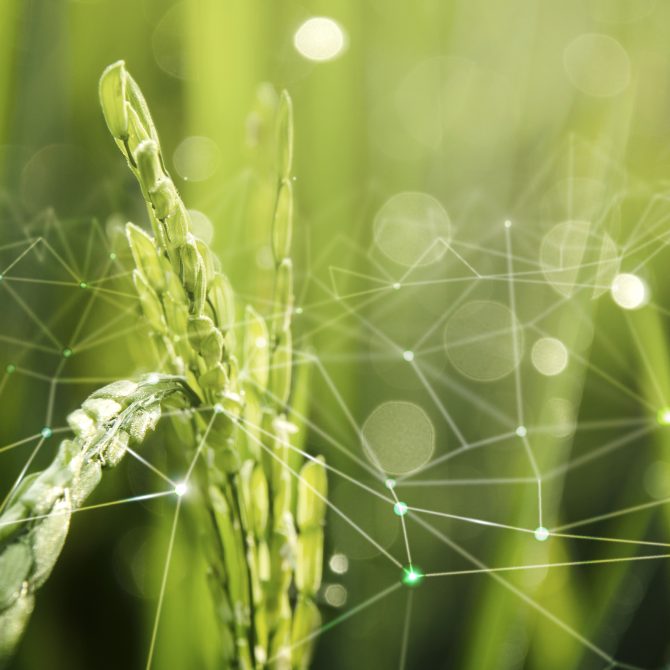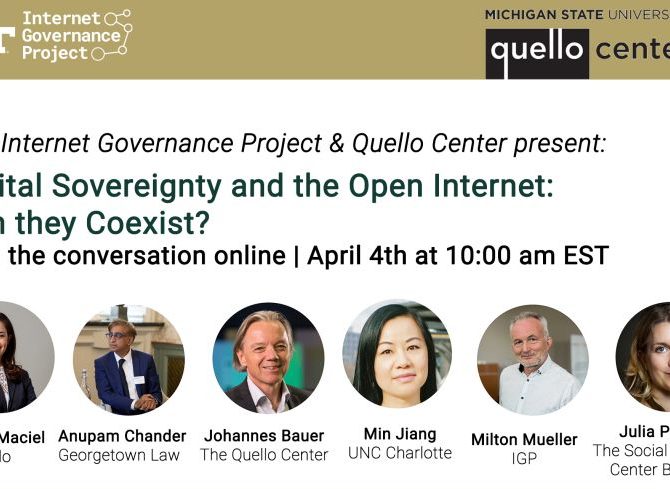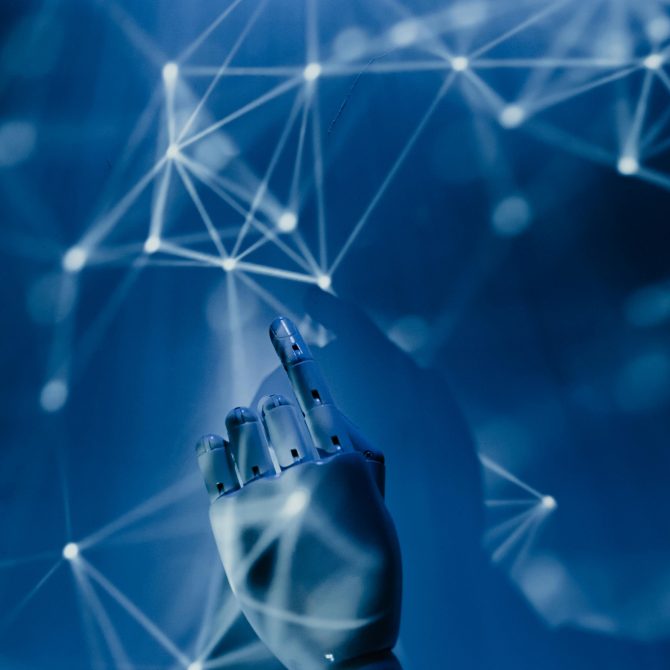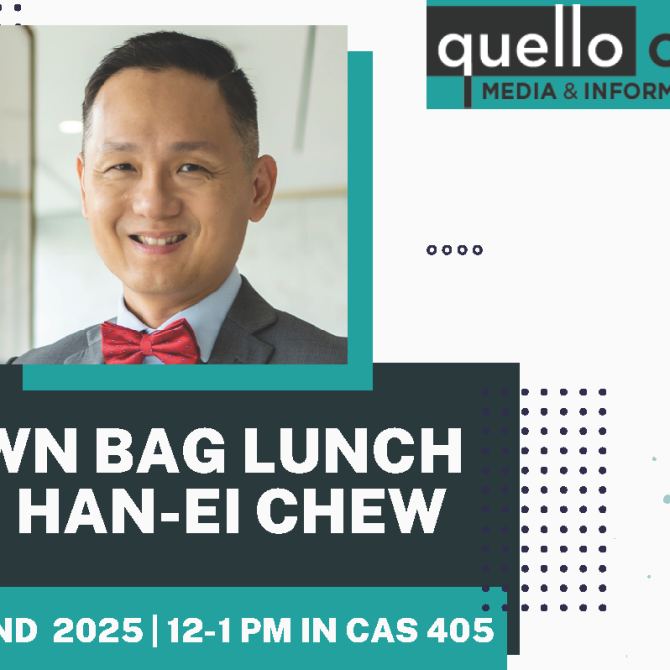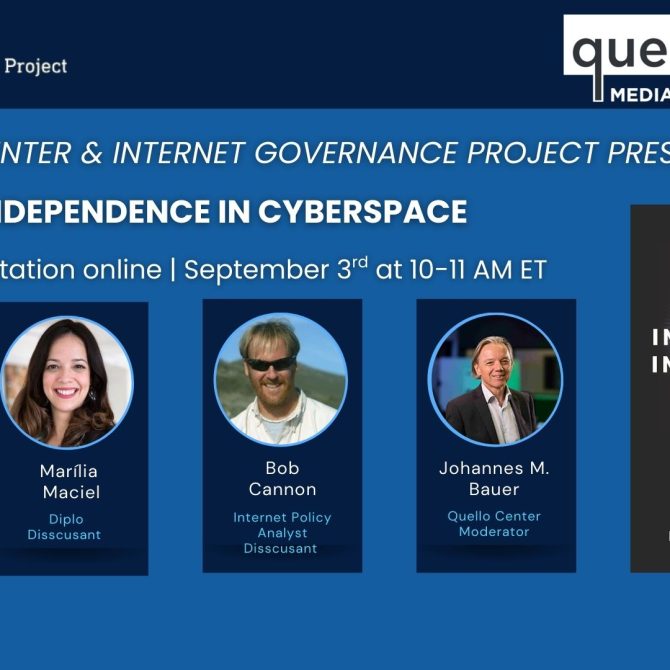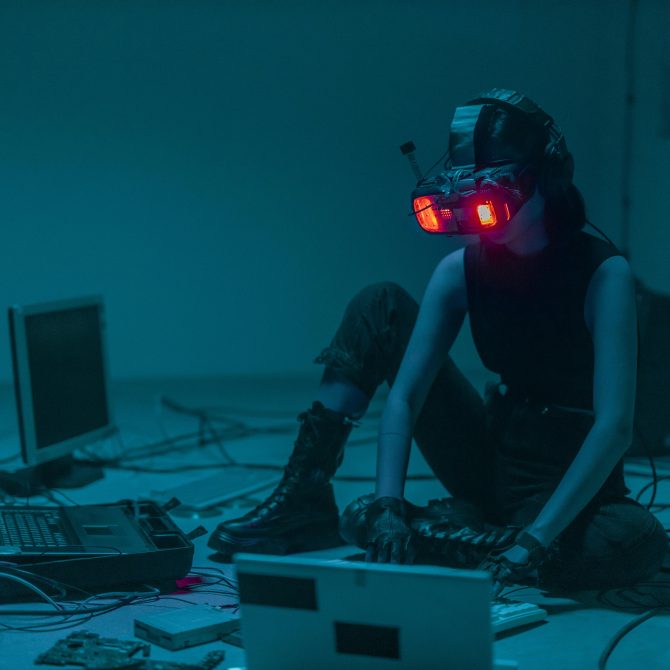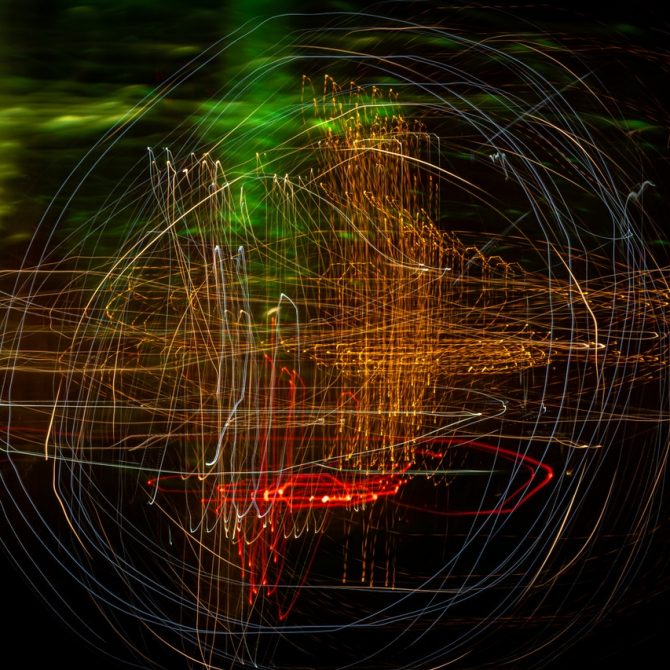Events
VIEW PAST EVENTS: ALL | 2021 TO PRESENT
The Return of the State into the Digital Economy
Johannes M. Bauer will give an online seminar on Thursday, January 5, 11 AM-12 noon, on “The Return of the State into the Digital Economy”. The seminar is organized jointly by the Center for Tele-Information at Columbia University and the International Media Management Academic Association. Participation is free, but registration is required at https://citiimmaabauer2023.eventbrite.com.
Innovation and Competition in the Digital Economy Part I: Big Tech, Competition & Innovation in the Digital Economy
Joint event with the Weizenbaum Institute, Berlin Via WebEx | The panel is part of the Symposium on Innovation and Competition in the Digital Economy jointly organized by Prof. Johannes M. Bauer, Quello Center at Michigan State University, and Dr. Volker Stocker, Weizenbaum Institute for the Networked Society. The event will provide a stimulating venue for researchers from multiple fields, including economics/management and law, to discuss their work and perspectives on the roles of big tech for innovation and competition in the digital economy. Specifically, we would like to discuss the impact of big tech companies on competition and their […]
- 2023-02-08
- 1:00pm to 2:00pm
- Rural Computing Research Consortium
- 404 Wilson Rd, Room 405, East Lansing.
The Future is Multinetworked: Lessons for Broadband Networking from Rural Places, Morgan Vigil-Hayes, School of Informatics, Computing, and Cyber Systems at Northern Arizona University.
Join us in person, Communication Arts & Sciences Room 191 (South entrance) or via Zoom (sign up here). Event is Sponsored by the Rural Computing Research Consortium, Quello Center, American Indian and Indigenous Studies Program, and the Department of Computer Science and Engineering Rural places have experienced pernicious digital inequities for decades. Recent Pew Survey data finds that 28% of rural households in the US do not have broadband Internet access. For years, solutions to this digital divide have involved trillions of dollars invested into infrastructure that never quite bridges the gap. Instead of playing a perpetual game of technology […]
- 2023-02-24
- 11:00am to 12:00pm
- Quello Center
- Via Zoom, Please Click Image for a Full Event Description and to Register.
Digitization and Social Control: Toward a Cybernetic Political Economy with Milton Mueller, Georgia Institute of Technology
Via Zoom | So many of the debates about public policy and the digital economy revolve around issues that are social-cybernetic in nature. That is, they deal with control and communication, but not “in the animal and the machine,” as Norbert Wiener’s foundational definition of cybernetics would have it, but control and communication in social systems. AI applications are accused of reinforcing societal biases by replicating patterns that reflect past discriminatory decisions. We want to know how much of our social life can be automated or turned over to robots, and whether this increases or decreases our sense of control […]
- 2023-04-21
- 1:00pm to 2:00pm
- Quello Center
- Via Zoom, Please Click Image for a Full Event Description and to Register.
Privacy Protective Behavior and “The Biggest Lie on the Internet” with Dr. Jonathan Obar, York University
Via Zoom | RSVP Here | or email quello@msu.edu When ignoring service terms and agreement implications, people contribute to an internet meme known as “the biggest lie on the internet” (said to be “I agree to the terms and conditions”). This talk will review research unpacking the meme. This includes survey research addressing policy ignoring behaviors, analyses of the length/complexity of service terms, and clickwrap user interface designs. Findings suggest deceptive designs like the clickwrap, and long/complicated policies contribute to ignoring behaviours. Findings also suggest privacy protective behaviors are viewed as tangential to service use goals. This is problematic as online consent processes […]
- 2023-10-11
- 11:00am to 12:00pm
- Quello Center
- Via Zoom, Please Click Image for a Full Event Description and to Register.
Reflections on Power Shifts and the Fifth Estate with William H. Dutton OII Senior Fellow and an Oxford Martin Fellow, Oxford University and Emeritus Professor at USC
Via Zoom | RSVP Here | or email quello@msu.edu In the eighteenth century, the printing press enabled the rise of an independent press – the Fourth Estate – that helped check the power of governments, business, and industry. In similar ways, the internet and related digital media are enabling the empowerment of many ordinary individuals to form a more independent collectivity of networked individuals – a Fifth Estate. In my new book, The Fifth Estate, I argue that this network power shift is not only enabling greater democratic accountability in politics and governance but is also helping networked individuals to be empowered in their […]
- 2023-10-20
- 11:00am to 12:00pm
- Quello Center
- Via Zoom, Please Click Image for a Full Event Description and to Register.
The Emergent Logic of the Online Information Ecosystem with David Lazer, Northeastern University
Via Zoom | Follow the link at the bottom to add to your calendar The first part of this presentation examines the emergent and sometimes paradoxical logic of the internet news ecosystem, in particular: (1) collectively, news diets have become far more concentrated in a small number of outlets; (2) however, individuals have relatively diverse news diets– almost certainly far more diverse than was plausible pre-Internet (as measured by number of unique content producers); (3) the social-algorithmic curation system of the Internet tends to point people to content with their preferences, sometimes in unlikely places. The greater diversity of consumption of news measured […]
- 2023-11-14
- 3:00pm to 4:00pm
- Rural Computing Research Consortium
- Via Zoom, Please Click Image for a Full Event Description and to Register.
DataCare for Digital Twins: Participatory Data Analytics and the Social Licence to Operate Smart Cities with Dr. Marcus Foth, Queensland University of Technology School of Design
Marcus Foth is a Professor of Urban Informatics in the School of Design and a Chief Investigator in the QUT Digital Media Research Centre (DMRC), Faculty of Creative Industries, Education, and Social Justice, Queensland University of Technology, Brisbane, Australia. He is a founding member of the More-than-Human Futures research group. Marcus’ research brings together people, place, and technology. His current research foci include: urban media and geoprivacy; data care in smart cities; digital inclusion and participation; blockchain and food supply chains; and sustainability and more-than-human futures.
- 2024-01-10
- 12:00pm to 1:00pm
- Quello Center
- Via Zoom, Please Click Image for a Full Event Description and to Register.
Placing bets and avoiding debts: Where working-class parents see opportunities in a technologizing future with Dr. Vikki Katz, Chapman University
Via Zoom RSVP Here | or email quello@msu.edu Evolving technologies are changing how young people learn and the kinds of work their parents do. These changes create uncertainty about how adults can ensure stability and mobility in the workforce today, and how to prepare for what they anticipate work will look like for their children in the future. How parents and children answer these questions is heavily influenced by their “technological timelines”: how they see their families and communities having been affected by technological changes past, present, and future. This presentation presents an in-depth view on how working-class Black and White families in […]
Responsible innovation for climate-smart agriculture: Cases from the U.S. and remote mountain communities of Pakistan with Dr. Maaz Gardezi, Virginia Tech
In Person in CAS Room 191 and Via Zoom RSVP Here | or email quello@msu.edu A Rural Computing Research Consortium/Quello Center joint event. Responsible innovation can be helpful in the realm of developing climate-smart farming tools, where data-driven technologies, AI modeling, and localized farm data can enable climate adaptation and mitigation. However, to achieve benefits of these innovations for the public interest and for scaling up, it is imperative to cultivate trust among a range of actors and organizations across the food system value chain. This trust-building process necessitates the development of transparent pathways for converting raw data into actionable insights, a task that […]
- 2024-02-21
- 12:00pm to 1:00pm
- Quello Center
- Via Zoom, Please Click Image for a Full Event Description and to Register.
Evaluations of Telehealth During the COVID-19 Public Health Emergency with Dr. Jessica S. Ancker, Vanderbilt University
Via Zoom RSVP Here | or email quello@msu.edu Early in 2020, the use of telehealth for primary care exploded because of the COVID-19 pandemic. Funded by PCORI, their team launched an extensive set of quantitative and qualitative evaluations of this natural experiment and its impact on healthcare. Ancker will report on their findings about patient and provider experiences in three states on the basis of interviews and surveys, as well as a Medicare claims-based analysis of the effects of telehealth on preventable healthcare utilization. Jessica S. Ancker, MPH, PhD, is a professor of biomedical informatics and health policy at Vanderbilt University Medical Center. […]
- 2024-04-17
- 12:00pm to 1:00pm
- Quello Center
- Via Zoom, Please Click Image for a Full Event Description and to Register.
DigitalNWT: Codesigning community networking literacies with rural/remote Northern Indigenous communities in Northwest Territories, Canada with Dr. Rob McMahon, University of Alberta
Via Zoom RSVP Here | or email quello@msu.edu Persistent digital divides exist between Northern and Southern Canada, and among communities in Northern Canada. Along with large-scale commercial telecommunications projects, locally designed and deployed networks offer potential solutions to improve connectivity. Community Networks involve residents in the deployment, ownership, and control of digital infrastructures – though such efforts also face many challenges. In this presentation Dr. McMahon will introduce DigitalNWT, a participatory action research initiative focused on these issues. After an overview of DigitalNWT’s research, education and policy engagement activities, he will discuss the process that was used to codesign community networking resources with […]
- 2024-09-11
- 12:00pm to 1:00pm
- Quello Center
- Via Zoom, Please Click Image for a Full Event Description and to Register.
Digital Authoritarianism in the Making? with Françoise Daucé, Benjamin Loveluck, and Francesca Musiani
Via Zoom – RSVP Here The Quello Center 2024-2025 speaking series is co-hosted by the Information Policy Workshop and presents works-in-progress on topics covered by the Information Policy Book Series of The MIT Press. The series is co-organized by Sandra Braman and Keith Hampton. Proposals for presentations (and for books!) are welcome; please contact Sandra at bramansa@msu.edu if you are interested. All talks will be recorded and will be available to those who have registered. For a copy of the recording, please reach out to Ashley Wilson at wils1620@msu.edu In the wake of the end of the USSR, the Russian Internet initially developed […]
Facticity: Its Rise, Fall, and Misplacement with Dr. Sandra Braman
Join us in person in room CAS 233 or via Zoom (register here). Dr. Sandra Braman, Scholar and Professor of Media & Information. John Locke’s An Essay on Human Understanding (1690) introduced his concept of the fact and became the most important book of the 17th and 18th centuries after the Bible. As Tom Wolfe put it, the effects of the turn to reason in text were as powerful as “the introduction of electricity into machine technology.” Facticity is the social formation that resulted across Western societies — the social orientation around the fact, whether towards or away. This presentation will briefly […]
- 2024-10-09
- 11:00am to 12:00pm
- Quello Center
- Via Zoom, Please Click Image for a Full Event Description and to Register.
Medicine hacking: Surviving late stage capitalism with DIY-medicine a talk by Johan Söderberg, Göteborg University
Via Zoom – RSVP Here The Quello Center 2024-2025 speaking series is co-hosted by the Information Policy Workshop and presents works-in-progress on topics covered by the Information Policy Book Series of The MIT Press. The series is co-organized by Sandra Braman and Keith Hampton. Proposals for presentations (and for books!) are welcome; please contact Sandra at bramansa@msu.edu if you are interested. All talks will be recorded and will be available to those who have registered. For a copy of the recording, please reach out to Ashley Wilson at wils1620@msu.edu On a planet of waste, where whole populations and regions are written off as externalities, the notion […]
- 2024-11-18
- 11:00am to 12:00pm
- Rural Computing Research Consortium
- Via Zoom, Please Click Image for a Full Event Description and to Register.
Reforming Intellectual-Property Policies to Promote Agricultural Innovation with Dr. Leland Glenna, Penn State
Via Zoom RSVP Here | or email quello@msu.edu A Rural Computing Research Consortium/Quello Center joint event. Between June and September of 2024, the United States Patent and Trademark Office (USPTO) accepted public comments on whether a statutory law should be established to allow an experimental use exception for products protected by utility patents. This problem has emerged because of conflicting court decisions over whether scientific research on patented products constitutes patent infringement. Agricultural crops were immune to these concerns until the 1980s, when utility patents began to be applied to living organisms. Prior to this, crops were protected by the Plant Variety Protection Act […]
- 2025-04-04
- 10:00am to 11:00am
- Internet Governance Project, Georgia Tech
- Via Zoom, Please Click Image for a Full Event Description and to Register.
Digital Sovereignty and the Open Internet: Can they Coexist?
Via Zoom RSVP Here | or email quello@msu.edu An Internet Governance Project (IGP)/Quello Center joint event. On April 4, 2025, the Internet Governance Project (IGP) in collaboration with the Quello Center will gather scholars of differing views to debate what digital sovereignty means, how it is being used as a label, and whether the various interpretations of the term are compatible with the foundational values of the open internet. Recently, new books and analyses have been published, including the book edited by Min Jiang and Luca Belli, Digital sovereignty in the BRICS countries (Cambridge, 2025), the volume by Johannes Thumfart, The liberal internet […]
- 2025-04-14
- 12:00pm to 1:00pm
- Quello Center
- Via Zoom, Please Click Image for a Full Event Description and to Register.
Full Stack AI Governance
Robert Gorwa, WZB Berlin Social Science Center Michael Veale, University College London Via Zoom To RSVP please email quello@msu.edu Every time someone trains, deploys, or queries an ‘artificial intelligence’ system, whether they know it or not, they are implicating the practices and services of an enormous number of interlinked businesses in the AI ‘stack’. In this talk, Robert Gorwa and Michael Veale will present early findings from their ongoing book project on emerging public-private regulatory practices emerging across this stack, focusing on what does, could, and should be done to prevent very real emergent forms of AI misuse. As more obligations […]
(Re)Working AI: Designing Workplace Technologies with and for Labor
Sarah Fox, Carnegie Mellon University in the Human Computer Interaction Institute In Person: Communication Arts and Sciences Room 191 Online: Via Zoom- RSVP Here or please email quello@msu.edu Work is transforming rapidly. While some might suggest labor is in a perpetual state of change, the accelerated development and deployment of artificially intelligent (AI) systems within workplaces is set to reshape the livelihoods of millions of workers across industries for decades to come. Though proponents see potential in automation as a means to rid work of monotony and boost productivity, many workers and worker advocates view AI as an existential threat […]
Borrowing Berlo: Singapore’s Evolving Approach to Online Harms with Han Ei Chew
Borrowing Berlo: Singapore’s Evolving Approach to Online Harms a Brownbag lunch with Dr Han-Ei CHEW, Visiting Fellow, Quello Center, Michigan State University. Tuesday September 2, 2025, 12-1 PM EDT In-Person CAS 405 Please Register HERE Singapore has developed one of the most comprehensive legal frameworks in the Asia-Pacific region to address online harms, spanning issues such as misinformation, cyber harassment, and image-based sexual abuse. In recent years, legislative efforts have taken on a more consultative approach, incorporating more public consultations and expert roundtables in the policymaking process. This includes the forthcoming Online Safety (Relief and Accountability) Bill, which aims to […]
- 2025-09-03
- 10:00am to 11:00am
- Internet Governance Project, Georgia Tech
- Via Zoom, Please Click Image for a Full Event Description and to Register.
Declaring Independence in Cyberspace: Internet Self-Governance and the End of US Control of ICANN
Declaring Independence in Cyberspace: Internet Self-Governance and the End of US Control of ICANN a conversation with Milton L. Mueller, Professor, Georgia Institute of Technology Marília Maciel, Digital Policy Senior Researcher at Diplo Foundation Bob Cannon, Internet Policy Analyst Join us on September 3, 2025, from 10:00 – 11:00 am EDT for what is sure to be a riveting discussion! Use the link here to register for the Zoom webinar: https://tinyurl.com/yh9m8wh8 Originally, ICANN was a bold institutional innovation based on a vision of Internet governance that was thoroughly globalized and independent of nation-states. The recent MIT Press book by Milton […]
Measuring Digital Trust: A Framework for Smart Societies with Han Ei Chew
Measuring Digital Trust: A Framework for Smart Societies a conversation with Dr Han-Ei CHEW, Visiting Fellow, Quello Center, Michigan State University. Tuesday September 16, 2025, 12-1 PM EDT In-Person (CAS 191) and Via Zoom (Register Here) Trust undergirds digital life — essential, yet often vaguely defined and rarely measured with rigor. Since the Cambridge Analytica scandal, global trust in the tech industry has declined even as digital systems have become more deeply embedded in everyday life. This raises a fundamental question: what exactly is this trust that is being lost, and how should we understand its erosion? This talk explores […]
- 2025-09-25
- 2:00pm to 3:00pm
- Quello Center
- Via Zoom, Please Click Image for a Full Event Description and to Register.
The Digital Usage Divide: Evidence and New Measures from 40 Million Windows Devices
The Digital Usage Divide: Evidence and New Measures from 40 Million Windows Devices a talk with Shane Greenstein, Harvard Business School Join us on September 25, 2025, from 2:00-3:00 pm EDT for what is sure to be a fascinating exchange! Use the link here to register for the Zoom webinar: https://tinyurl.com/4wzk5mm7 A Joint event brought to you by the Quello Center and the Broadband Access Initiative of the Pew Charitable Trusts Access to digital infrastructure is crucial for economic opportunities, social inclusion, and civic participation. However, the use of digital technologies may be unevenly distributed, leaving some communities unable to […]
A Theory of the One Percent with Chris Adami
A Brownbag Lunch with Dr Chris Adami, Microbiology and Molecular Genetics & Physics and Astronomy, Michigan State University. Wednesday October 22, 2025, 12-1 PM EDT In-Person CAS 405 and on Zoom Please Register HERE Light refreshments will be provided. Chris Adami has done innovative work in applying evolutionary methods and game theory to complex phenomena, social issues, cognitive issues, and artificial life. He often writes in non-technical ways for broader audiences, and his contributions regularly appear in Nature. The brownbag lunch talk explores the systemic nature of inequality in a highly abstract framework to isolate critical factors that drive inequality but […]
- 2025-12-11
- 2:00pm to 3:00pm
- Pew
- Via Zoom, Please Click Image for a Full Event Description and to Register.
Data-Driven Broadband Policymaking: Bridging the Data Gaps for Effective Policymaking with BQT
Co-sponsored talk by the PEW Broadband Access Initiative & the Quello Center with Laasya Koduru, PhD Student at UC Santa Barbra Thursday, December 11, 2025, 2-3 PM EST Via Zoom | Please Register HERE Effective broadband policy depends on accurate, granular data on service availability, speeds, and prices—yet existing datasets are often self-reported, inconsistent, and insufficient for evaluating affordability or targeting public investments. This talk will introduce the Broadband-Plan Querying Tool (BQT), which independently collects advertised broadband plans directly from ISP websites at street-address resolution to provide a more reliable evidence base. It will show how BQT enabled audits of the FCC’s […]


